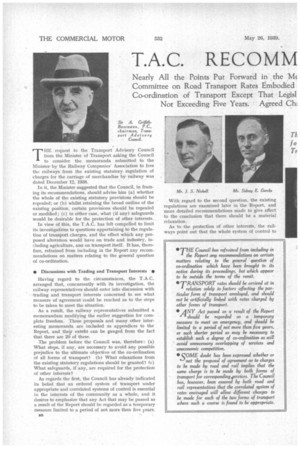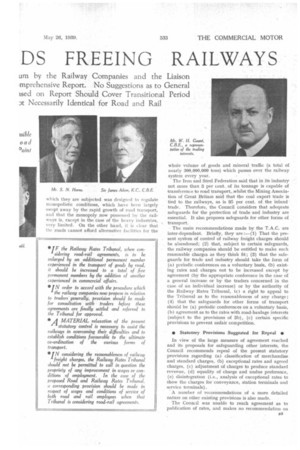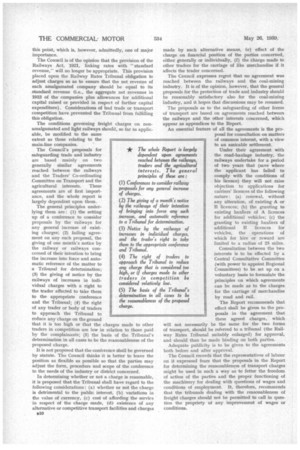T.A.C. RECOMM DS FREEING RAILWAYS
Page 42

Page 43

Page 44

If you've noticed an error in this article please click here to report it so we can fix it.
Nearly All the Points Put Forward in the Mc Committee on Road Transport Rates Embodied Co-ordination of Transport Except That Legisl Not Exceeding Five Years. Agreed Ch: urn by the Railway Companies and the Liaison tr[prehensive Report. •No Suggestions as to General tsed on Report Should Cover Transitional Period Dt Necessarily Identical for Road and Rail
THE request to the Transport Advisory Council from the Minister of Transport asking the Council to consider the memoranda submitted to the Minister by the Railway Companies' Association to free the railways from the existing statutory regulation of charges for the carriage of merchandise by railway was dated December 12, 1938.
In it, the Minister suggested that the Council, in framing its recommendations, should advise him (a) whether the whole of the existing statutory provisions should be repealed; or (b) whilst retaining the broad outline of the existing position, certain provisions should be repealed or modified ; (c) in either case, what (if any) safeguards would be desirable for the protection of other interests.
In view of this, the T.A.C. has felt compelled to limit its investigations to questions appertaining to the regulation of transport charges, and the effect which any proposed alteration would have on trade and industry, including agriculture, and on transport itself. It has, therefore, refrained from including in the Report any recommendations on matters relating to the general question of co-ordination.
• Discussions with Trading and Transport Interests • Having regard to the circumstances, the T.A.C. arranged that, concurrently with its investigation, the railway representatives should enter into discussion with trading and transport interests concerned to see what measure of agreement could be reached as to the steps to be taken to meet the situation.
As a result, the railway representatives submitted a memorandum modifying the earlier suggestion for complete freedom. These proposals and many other interesting memoranda are included as appendices to the Report, and their extent can be gauged from the fact that there are 26 of these.
The problem before the Council was, therefore: (a) What steps, if any, are necessary to avoid any possible prejudice to the ultimate objective of the co-ordination of all forms of transport? (b) What relaxations from the existing statutory regulations should be granted? (c) What safeguards, if any, are required for the protection of other interests?
As regards the first, the Council has already indicated its belief that an ordered system of transpOrt under appropriate and correlated systems of control is essential in the interests of the community as a whole, and it desires to emphasize that any Act that may be passed as a result of the Report should be regarded as a temporary measure limited to a period of not more than five years. With regard to the second question, the existing regulations are examined later in the Report, and more detailed recommendations made to give effect to the conclusion that there should be a material relaxation.
As to the protection of other interests, the railways point out that the whole system Of control to
which they are subjected was .designed to regulate monopolistic conditions, which have been largely swept away by the rapid growth of road transport, and that the monopoly now possessed lw the railways is, except in the case of the heavy industries, very limited. On the other hand, it is clear that the roads cannot afford alternative facilities for the
whole volume of goods and mineral traffic (a total of nearly 300,000,000 tons) which passes over the railway system every year.
The Iron and Steel Federation said that in its industry not more than 3 per cent. of its tonnage is capable of transference to road transport, .whilst the Mining Association of Great Britain said that the coal export trade is tied to the railways, as is 95 per cent. of the inland trade. Therefore, the Council considers that adequate safeguards for the protection of trade and industry are essential. It also, proposes safeguards for other forms of transport.
The main recommendations made by the T.A.C. are inter-dependent. Briefly, they are :—(1) That the present system of control of railway freight charges should be abandoned; (2) that, subject to certain safeguards, the railway companies should be entitled to make such reasonable charges as they think fit ; (3) that the safeguards for trade and industry should take the form of (a) periodic conferences on a voluntary basis, (b) existing rates and charges not to be increased except by agreement (by the appropriate conference in the case of a general increase or by the traders concerned in the case of an individual increase) or by the authority of the Railway Rates Tribunal, (c) a right to appeal to the Tribunal as to the reasonableness of any charge; (4) that the safeguards for other forms of transport should be (a) periodic conferences on a voluntary basis, (b) agreement as to the rates with road-haulage interests (subject to the provisions of 3b), (c) certain specific provisions to prevent unfair competition.
• Statutory Provisions Suggested for Repeal • In view of the large measure of agreement reached and its proposals for safeguarding other interests, the Council recommends repeal of the present statutory provisions regarding (a) classification of merchandise and standard charges, (b) exceptional rates and agreed charges, (c) adjustment of charges to produce standard revenue, (d) equality of charge and undue preference, (e) disintegration (i.e., analysis of exceptional rates to show the charges for conveyance, station terminals and service terminals).
A number of recommendations of a more detailed nature on other existing provisions is also made, The Council was unable to reach agreement as to publication of rates, and makes no recommendation on this point, which is, however, admittedly, one of major importance.
The Council is of the opinion that the provision of the Railways Act, 1921, linking rates with "standard revenue," will no longer be appropriate. This provision placed upon the Railway Rates Tribunal obligation to adjust charges so as to ensure that the net revenue of each amalgamated company should be equal to its standard revenue (i.e., the aggregate net revenues in 1913 of the companies plus allowances for additional capital raised or provided in respect of further capital expenditure). Considerations of bad trade or transport competition have prevented the Tribunal from fulfilling this obligation.
The conditions governing freight charges on nonamalgamated and light railways should, so far as applicable, be modified to the same extent as those relating to the main-line companies.
The Council's proposals for safeguarding trade and industry are based mainly on two generally similar agreements reached between the railways and the Traders' Co-ordinating Committee on Transport and the agricultural interests. These agreements are of first importance, and the whole report is largely dependent upon them.
The general principles underlying them are : (1) the setting up of a conference to consider proposals by the railways for any general increase of existing charges; (2) failing agreement on any such proposal, the giving of one month's notice by the railway or railways concerned of their intention to bring the increase into force and automatic reference of the matter to a Tribunal for determination; (3) the giving of notice by the railways of increases in individual charges with a right to the trader affected to take them to the appropriate conference and the Tribunal; (4) the right of any trader or body of traders to approach the Tribunal to reduce any charge on the ground that it is too high or that the charges made to other traders in competition are low in relation to those paid by the complainants; (5) the basis of the Tribunal's determination in all cases to be the reasonableness of the proposed charge.
It is not proposed that the conference shall be governed by statute. The Council thinks it is better to leave the position as flexible as possible so that the parties may adjust the form, procedure and scope of the conference to the needs of the industry or district concerned.
In determining whether or not a charge is reasonable, it is proposed that the Tribunal shall have regard to the following considerations (a) whether or not the charge is detrimental to the public interest, (b) variations in the value of currency, (c) cost of affording the service in respect of the charge made, (d) existence of any alternative or competitive transport facilities and charges made by such alternative means, (e) effect of the charge on fmancial position of the parties concerned, either generally or individually, (f) the charge made to other traders for the carriage of like merchandise if it affects the trader concerned.
The Council expresses regret that no agreement was reached between the railways and the coal-mining industry. It is of the opinion, however, that the general proposals for the protection of trade and industry should be reasonably satisfactory also for the coal-mining industry, and it hopes that discussions may be resumed.
The proposals as to the safeguarding of other forms of transport are based on agreements reached between the railways and the other interests concerned, which appear as appendices to the Report.
An essential feature of all the agreements is the proposal for consultation on matters of common interest, with a view to an amicable settlement.
Under their agreement with the road-haulage industry, the railways undertake for a period of two years that (save where the applicant has failed to comply with the conditions of his licence) they will not raise objection to applications for carriers' licences of the following nature : (a) renewal, without any alteration, of existing A. or B licences; (b) the granting to existing hauliers of A licences for additional vehicles; (c) the granting to existing hauliers of additional B licences for vehicles, the operations of which for hire or reward are limited to a radius of 25 miles.
Consultation between the two interests is to be effected by a Central Consultative Committee (with power to appoint Regional Committees) to be set up on a voluntary basis to formulate the principles on which agreements can be made as to the charges for the carriage of merchandise by road and rail.
The Report recommends that effect shall be given to the proposals in the agreement that these agreed charges, which will not necessarily be the same for the two forms of transport, should be referred to a tribunal (the Railway Rates Tribunal suitably enlarged) for approval, and should then be made binding on both parties.
Adequate publicity is to be given to the agreements both before and after approval.
The Council records that the representatives of labour on it expressed fears that the proposals in the Report for determining the reasonableness of transport charges might be used in such a way as to fetter the freedom of action of the parties and the proper functioning of the machinery for dealing with questions of wages and conditions of employment. It, therefore, recommends that the tribunals dealing with the reasonableness of freight charges should not be permitted to call in question the propriety of any improvement of wages or conditions.




















































































